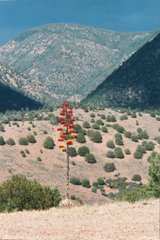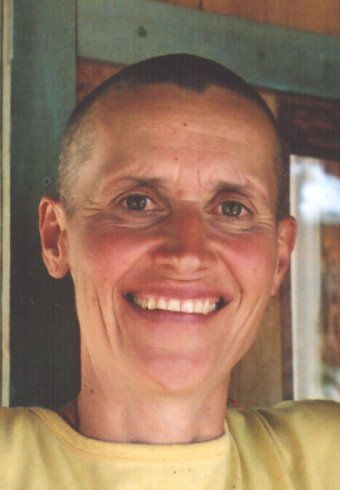Tonight, while de-cluttering the kitchen, moving this over there and removing that altogether, I thought about renunciation; not an easy idea for us in the west to be with. Implications of loss, reduction, contraction. Shaving back with a blunt razor, a process likely to create painful wounds that we fear may never heal.
The decision for me to take robes, become a nun, was neither painless nor simple. Although the idea rose quickly in my mind after my life intersected with my teacher, just as it had floated in my mind in my youth, it was not a straightforward choice. My life appeared happy: I was in a long-term relationship that had weathered some difficult times, yet was in a place of unity and joy. I owned a house I had bought spontaneously because it felt like home: open, spacious, safe, and in which we both lived. I had 3 cats and a dog who had been with me for many years, and were my children. My ambition to be a writer seemed almost to be within reach, with some awards and publications. I was in the place I thought I had wanted to be for a very long time.
But the ground began to creak, a subtle tremor of uncertainty, of another possibility rippled across my heart. Nothing huge like a billboard announcing a change, just a quivering that something most fundamental had shifted. It was both welcome and not; there was a sense of knowing I was moving to where I had always yearned to be, though I did not know where that was, and yet there was a deep abiding reluctance to let go of that which I cherished. There was panic and tears, waves of anguish, moments of joy. Certainty that I would stay in my life as it was, jarred by the realization that that was no longer even a possibility. It was a long painful minuet, of coming together and separation and coming together again. We talked, I prayed, I searched for an answer. I clung tearfully to everything I had known, trying to stay afloat, while at the very same time watching my life as it had been recede like the tide. It was a long 18 months of coming to terms with that which, from the very beginning, was ultimately inevitable. In a sense, although I made the choice, I knew I had no option.
During this time, as the decision grew nearer, I contemplated renunciation. I knew that in taking the vows there was a list of things I would renounce – activities, my hair, my clothes. My earrings! But somehow this was not really what my heart was telling me about the essence of renunciation. As I moved into the place of letting go of what had been important, there was never a sense of reduction, but one of expansion. As if shedding an old ragged coat and discovering a jeweled mantle, long hidden beneath. I knew I was stepping into the vast unknown of unlimited potential: not giving anything up, but rather embracing so much more.
In a sense we are continually letting go: acquisition, then loss, it is a habit of our lives. Buddhist or not, we live through the coming together and separation, the picking up and laying down, the moving towards and then away – even until the moment when we will renounce the very act of inhalation. This is the form and texture of our roller-coaster lives. Whether we like it or not, it is our daily experience.
Becoming a nun was the method for me to make sense of the world and how to move through it; it was a catalyst to propel me to a place where I can know from the inside out the true nature of what is. But it is not the only way forward; renunciation has many hues and tones. It is a view of the world, of digging deeper in yourself and, yes, perhaps of shaving back to a sometimes aching wound. Yet knowing with certainty it will heal. It is a life-long process of being willing to look, review, change. To promise in one’s heart to make a difference for the better, and then having the courage to take those steps. It is a commitment to being whom you truly are – kind, generous, wise, open-minded. It is neither static nor contrived: it is movement, growth, unfolding.
There is a line in one of our prayers that resonates with me: The Bodhicitta is without expectation or disappointment. The Bodhicitta, that great and wise compassion always present in every heart. In a way, renunciation is simply the means to realize this, to understand that there is nothing to yearn for or to let go of. Renunciation is about discovering the wealth in our hearts and our lives, and rejoicing. There is nothing small or tight or diminished by renunciation. It is the tilt of your head towards the sunshine, the prickling of your skin by the breeze, it is the sound of the ocean in a shell. Renunciation is abandoning everything that will cause suffering, and embracing instead the very cause of joy. It is not just about being a nun; it is about being true to your heart, for the sake of the world and all creatures.
The decision for me to take robes, become a nun, was neither painless nor simple. Although the idea rose quickly in my mind after my life intersected with my teacher, just as it had floated in my mind in my youth, it was not a straightforward choice. My life appeared happy: I was in a long-term relationship that had weathered some difficult times, yet was in a place of unity and joy. I owned a house I had bought spontaneously because it felt like home: open, spacious, safe, and in which we both lived. I had 3 cats and a dog who had been with me for many years, and were my children. My ambition to be a writer seemed almost to be within reach, with some awards and publications. I was in the place I thought I had wanted to be for a very long time.
But the ground began to creak, a subtle tremor of uncertainty, of another possibility rippled across my heart. Nothing huge like a billboard announcing a change, just a quivering that something most fundamental had shifted. It was both welcome and not; there was a sense of knowing I was moving to where I had always yearned to be, though I did not know where that was, and yet there was a deep abiding reluctance to let go of that which I cherished. There was panic and tears, waves of anguish, moments of joy. Certainty that I would stay in my life as it was, jarred by the realization that that was no longer even a possibility. It was a long painful minuet, of coming together and separation and coming together again. We talked, I prayed, I searched for an answer. I clung tearfully to everything I had known, trying to stay afloat, while at the very same time watching my life as it had been recede like the tide. It was a long 18 months of coming to terms with that which, from the very beginning, was ultimately inevitable. In a sense, although I made the choice, I knew I had no option.
During this time, as the decision grew nearer, I contemplated renunciation. I knew that in taking the vows there was a list of things I would renounce – activities, my hair, my clothes. My earrings! But somehow this was not really what my heart was telling me about the essence of renunciation. As I moved into the place of letting go of what had been important, there was never a sense of reduction, but one of expansion. As if shedding an old ragged coat and discovering a jeweled mantle, long hidden beneath. I knew I was stepping into the vast unknown of unlimited potential: not giving anything up, but rather embracing so much more.
In a sense we are continually letting go: acquisition, then loss, it is a habit of our lives. Buddhist or not, we live through the coming together and separation, the picking up and laying down, the moving towards and then away – even until the moment when we will renounce the very act of inhalation. This is the form and texture of our roller-coaster lives. Whether we like it or not, it is our daily experience.
Becoming a nun was the method for me to make sense of the world and how to move through it; it was a catalyst to propel me to a place where I can know from the inside out the true nature of what is. But it is not the only way forward; renunciation has many hues and tones. It is a view of the world, of digging deeper in yourself and, yes, perhaps of shaving back to a sometimes aching wound. Yet knowing with certainty it will heal. It is a life-long process of being willing to look, review, change. To promise in one’s heart to make a difference for the better, and then having the courage to take those steps. It is a commitment to being whom you truly are – kind, generous, wise, open-minded. It is neither static nor contrived: it is movement, growth, unfolding.
There is a line in one of our prayers that resonates with me: The Bodhicitta is without expectation or disappointment. The Bodhicitta, that great and wise compassion always present in every heart. In a way, renunciation is simply the means to realize this, to understand that there is nothing to yearn for or to let go of. Renunciation is about discovering the wealth in our hearts and our lives, and rejoicing. There is nothing small or tight or diminished by renunciation. It is the tilt of your head towards the sunshine, the prickling of your skin by the breeze, it is the sound of the ocean in a shell. Renunciation is abandoning everything that will cause suffering, and embracing instead the very cause of joy. It is not just about being a nun; it is about being true to your heart, for the sake of the world and all creatures.



3 comments:
Kunzang-la,
again, I am truly grateful and moved by your words-- more by your depth of sharing.
with profound gratitude,
maura
Maura - I really appreciate your comments. It is a great joy to write, but even more so to know the words have touched someone else.
Speech is a gift between us all, creating the opportunity for writer and reader alike to contemplate, to share and to meet with the heart.
I have made many prayers that my words may be of benefit, and Hayagriva holds a special place in my heart.
Thank you.
Dear Ani-la ~ Your words have become a source of inspiration. Thank you for that gift.
~Sherab
Post a Comment